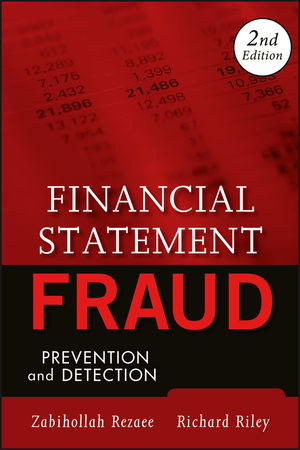Financial Statement Fraud: Prevention and Detection, 2nd EditionISBN: 978-0-470-45570-8
Hardcover
352 pages
September 2009
 This is a Print-on-Demand title. It will be printed specifically to fill your order. Please allow an additional 15-20 days delivery time. The book is not returnable.
|
||||||
Foreword xi
Preface xiii
Acknowledgments xix
Part One: Financial Reporting and Financial Statement Fraud 1
1 Financial Statement Fraud Defined 3
Will History Repeat Itself? 3
A Closer Look 4
Definition of Financial Statement Fraud 4
Nature of Financial Statement Fraud 8
High-Impact Fraud Cases 11
Cost of Financial Statement Fraud 13
Fraud Studies and Regulatory Responses 16
Antifraud Programs 19
Occurrence, Prevention, and Detection 22
Lessons Learned and Applications for Practice 25
Notes 28
2 Financial Reporting Structure 31
Introduction 31
Financial Reporting System 31
Importance of Financial Information 33
Annual Financial Reporting Requirements 38
High-Quality Financial Reports 39
Six-Legged Stool of the Financial Reporting Process 41
Corporate Financial Reports 42
Corporate Reporting Challenges 44
Financial Restatements 45
Fair Value 46
Stock Options Accounting 46
XBRL-Generated Financial Reports 47
Antifraud Applications for Practice 48
Notes 52
Part Two: Financial Statement Fraud Profile, Taxonomy, and Schemes 55
3 Cooking the Books Equals Fraud 57
Introduction 57
Why Does Financial Statement Fraud Occur? 57
Profile of Financial Statement Fraud 58
Waste Management, Inc.: Financial Statement Fraud Analysis 70
Antifraud Applications for Practice 72
Notes 76
4 Realization, Prevention, and Detection 78
Introduction 78
Realization 78
The 3Cs Model 79
Financial Statement Fraud Prevention 84
Financial Statement Fraud Detection 86
Correction Procedures 87
Prevention, Detection, and Correction Strategies 87
Antifraud Applications for Practice 89
Notes 96
5 Taxonomy and Schemes 97
Introduction 97
Symptoms of Financial Statement Fraud 97
Common Fraud Schemes 101
Common Revenue Fraud Schemes 103
Financial Statement Fraud Red Flags 105
Whistle-blower Regulations 112
Antifraud Applications for Practice 114
Notes 117
Part Three: Corporate Governance and Its Role in Preventing and Detecting Financial Statement Fraud 119
6 Role of Corporate Governance 121
Introduction 121
Definition of Corporate Governance 122
Role of Corporate Governance 122
Corporate Governance Structure 125
Characteristics of Corporate Governance 127
Corporate Governance Functions 128
Global Corporate Governance 132
Antifraud Applications for Practice 134
Notes 136
7 Board of Directors’ Oversight Responsibility 138
Introduction 138
Role of the Board of Directors 138
Composition of the Board of Directors 139
Functions of the Board of Directors 142
Attributes of Boards of Directors 145
Antifraud Applications for Practice 151
Protocol: A Plan for Reaction to Allegations of Misconduct 152
Notes 155
8 Audit Committees and Corporate Governance 157
Introduction 157
Audit Committee 157
Audit Committee Attributes 166
Audit Committee Roles and Responsibilities 168
Audit Committee Charters 172
Chairperson of Audit Committees 173
Audit Committee Report 173
Audit Committee Roles in Preventing and Detecting Financial Statement Fraud 177
Antifraud Applications for Practice 178
Notes 183
9 Management Responsibility 184
Introduction 184
Management Financial Reporting Responsibilities 184
Management’s Role in Financial Statement Fraud Prevention and Protection 190
Management Motives and Incentives 191
Management Override of Internal Control 192
Gamesmanship 194
Risk Management 196
Antifraud Applications for Practice 200
Notes 204
10 Role of the Internal Auditor 206
Introduction 206
Internal Auditors and Corporate Governance 206
Internal Auditors’ Responsibilities 208
Internal Audit Fraud Standards 212
Efficacy of Internal Audit in Financial Statement
Fraud Prevention and Detection 214
Cooperation between External and Internal Audit 215
Internal Audits and the Audit Committee 217
Internal Control 218
Antifraud Applications for Practice 225
Notes 227
11 Role of External Auditors 229
Introduction 229
Independent Audit of Financial Statements 229
Independent Auditor and Financial Statement Fraud 234
Independent Audit and Internal Control 237
Report on Internal Controls 238
Fraud Detection Audit Procedures 240
Materiality Guidance 246
Risk Factors of Financial Statement Fraud 249
Communication of Fraud 253
Antifraud Applications for Practice 254
Notes 256
12 Governing Bodies 258
Introduction 258
Role of Regulation in Corporate Governance 259
Sarbanes-Oxley Act of 2002 260
Securities and Exchange Commission 263
SEC’s Regulation Fair Disclosure 267
Financial Fraud Detection and Disclosure Act of 1992 268
Private Securities Reform Act of 1995 268
SEC and Financial Statement Fraud 269
SEC Fraud Prevention Activities 269
SEC Fraud Detection Activities 270
SEC Fraud Enforcement Activities 270
Role of the Financial Accounting Standards Board 273
Antifraud Applications for Practice 276
Notes 279
Part Four: Digital (Computer) Approaches to Fraud and Forensic Accounting 281
13 Fraud in a Digital Environment 283
Introduction 283
Digital Economy 284
Electronic Commerce 285
Changes in Business Environment 288
Electronic Financial Reporting 292
Antifraud Applications for Practice 302
Notes 305
14 Fraud Examination Practice, Education, and Research 306
Introduction 306
The Interrelationship: Auditing, Fraud Examination, and Forensic Accounting 307
Forensic Accounting Practice 308
Fraud Examination 310
Certification in Financial Forensics 313
Training Competent and Ethical Fraud Examiners and Forensic Accountants 313
Fraud Examination and Forensic Accounting Education 315
Role of Research in a Profession 316
Antifraud Applications for Practice 318
Notes 321
Appendix: Summary of Six Recent Fraud Studies 323
About the Authors 327
Index 329



